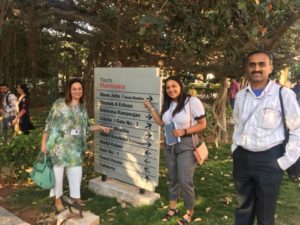19th March 2018 Delhi, India
Cross Catapult Collaboration


‘My success will not depend on what A or B thinks of me. My success will be what I make of my work.’
This quote by the namesake of the Newton-Bhabha Fund, Homi J. Bhabha, aptly describes the work of the UK Catapult Centres. Simply put, Catapults get things done when it comes to finding innovative solutions to urban challenges.
Catapults are a network of world-leading centres, funded by Innovate UK, designed to transform the UK’s capability for innovation in specific areas and to help drive future economic growth. In India, Catapults, along with local, state and national partners, are looking to work together, with support of the Newton-Bhabha Fund, to address issues of both economic development and social welfare and to grow collaboration, share knowledge and open markets between the two countries.
Several Catapults recently had the opportunity to engage in government, business and organisational meetings across New Delhi and Bengaluru, setup by the Science and Innovation Network and the Newton Fund in-country team, as part of a visit supported by Innovate UK. The Catapults four-day packed schedule included meetings on topics ranging from digital to high value manufacturing, energy, transport and air quality.
For the first time, four Catapults, the Energy Systems, Transport Systems, Satellite Applications and Future Cities Catapults, have joined forces to address an economic and social challenge. They are seeking to create a ‘whole systems’ approach to energy transition that would take into account the varied modes of transport in India, city planning and the impact on air quality. The Catapults were in India to better understand how UK innovations and businesses can partner with Indian counterparts to seek new solutions.
The issue of air quality in India has been brought to the forefront recently by concerned citizens, parents and residents who face a daily struggle in mobility, health and air quality. The issue is a complex one, spanning economic development to social welfare, and can only be addressed through a ‘whole systems’ approach. With a 25% increase in population, 300% increase in energy demand and 325 million people moving into its urban areas over the next 20 years, the implications for health and wellbeing, alongside the stress and strain on energy and infrastructure requires global attention and innovative solutions.
Energy Systems Catapult brings unique national energy modelling expertise to provide multiple options for future energy scenarios. Transportation Systems Catapult brings global best practice in understanding the shifting modes of transport that cities will need to adopt, and what they need to do to adopt them. Satellite Applications Catapult provides state-of-the-art data from space and from the ground to give the most accurate information to make the best decisions. And the Future Cities Catapult provides integrated urban planning solutions that take both a data interoperability and a citizen centred approach to urban challenges – creating innovative solutions with the human impact at the centre.
One of the companies that the cross-Catapult team met was Enzen, a global energy and environment company. Enzen provided a compelling argument to the ‘whole system’ approach by connecting-the-dots across the sources of energy available in India, linked to the types of emissions that are then produced. They explained that as a result of the emissions, the concentration of hazardous materials in the air and the dose that citizens are exposed to, leads to deadly health implications. Global expertise is needed to address this energy and health dilemma. Catapults can help.
India has a rich history of innovation and technology from the early beginnings of their space programme in 1969 to their advanced engineering and technical capabilities today, exemplified by organisations like the Centre for Study of Science, Technology and Policy (CSTEP).
During their short visit to India, the cross-Catapult team was able to engage in productive discussions with national organisations like The Energy and Resources Institute (TERI), and National Institute of Urban Affairs, who have a national view of the needs for energy modelling and a unique understanding of the impact in Indian urban centres.
The team met with National Indian energy companies Shell India and Tata Power, who are testing and implementing alternate clean forms of energy whilst also seeking Innovations to meet growing demands.
At the local level, conversations occurred with government organisations, including the Bangalore Metropolitan Transport Corporation and with the Bengaluru Commissioner N. Manjunatha Prasad who agreed to lend his support to ongoing cross-Catapult collaboration in India.
The team also had the unique opportunity to meet several Indian entrepreneurial start-ups, including Carbon Masters and Cell Propulsion, whose new ideas, energy, passion and commitment to India is sure to lend solutions to the growing and complex needs of the nation.
Working together, UK Catapults and Indian partners can start to bring new options, innovative technology and businesses and a shared learning to this critical issue. Our hope is that programmes such as the Newton-Bhabha fund, and the cross-Catapult work provide UK companies with new opportunities, new partners and a place to grow their businesses and increase exports; whilst also create lasting relationships that can provide long term sustainable solutions for India, for the UK and for others around the world facing similar challenges.
To learn more about the Catapult Centres, please visit: https://catapult.org.uk/
